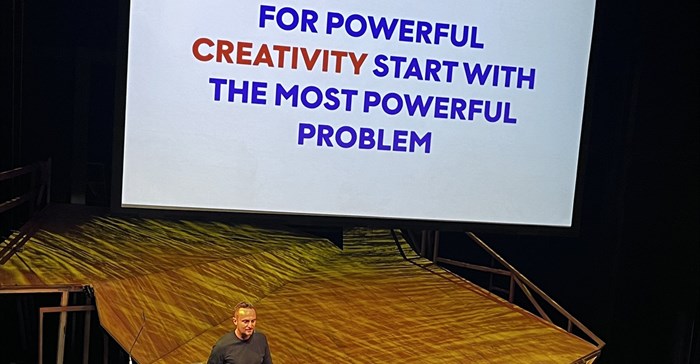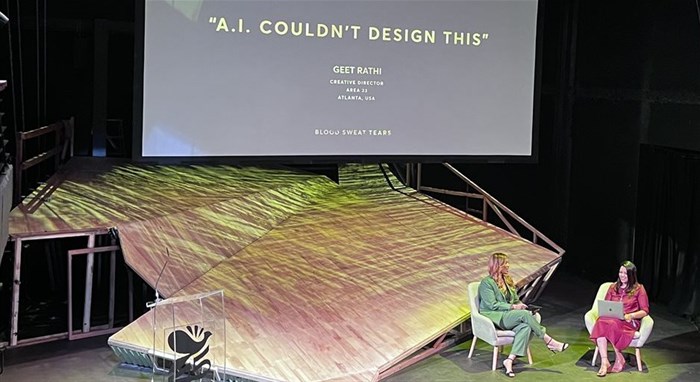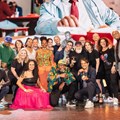#Loeries2023: Three lessons on how creative thinking can change the world

These industry experts shared their knowledge and insights at the Loeries Masterclasses and the International Seminar of Creativity on how creative thinking can affect societal outcomes, and how and why it wins awards.
3 Insights on creative thinking
- AI couldn’t design this
Creative director, VP of Area 23, New York-based creative agency specialising in healthcare, Geet Rathi tackled the burning topic of whether AI will take over creative jobs.
Although AI, our ‘new overlords’, can create beautiful art and will take some jobs, Rathi’s case studies set out to demonstrate its limitations, such as its inability to generate the special ideas that human designers bring to the creative process - such as those eureka moments, passion, chaos and all the stages of ‘creating jobs that I love’.

Blink to Speak is a new communication system for the healthcare industry, consisting of a groundbreaking graphic eye alphabet system, accompanying training manuals and technologies.
She used this as a case study to show how AI was used initially to yield useful feedback on communication methods to help paralysed people who have difficulties with speech, such as the use of simple vocabulary, symbols and colour coding.
However, she shows that while AI may be able to create, it cannot be the creator, while it can can imitate, it cannot innovate. The eureka moment could only have emerged from the human truth that patients that cannot communicate in any other ways, are able to make themselves understood by eye movement.
Neither can AI imbue any passion or feeling. The The Portuguese (Re)Constitution project from FCB Lisbon shows the backstory.
Between 1933 and 1974 Portugal lived under a dictatorial regime prohibiting freedom of speech, the case study shows how passionate poets and illustrators have reworked old texts to highlight only some words, a reversal of the very censorship techniques used by the oppressive regime.
The beautiful example of what the full freedom of human intelligence, artistry, emotion and expression can bring to bear has become a bestseller for Penguin Books and a poster example of what AII cannot do.
Parting bon mot from Rathi “I will hire AI, as my intern, not as my boss”.
- Finding impact solutions
CEO of Publicis Conseil, Marco Venturelli addresses the increasing obligation that brands have to fix many environmental and societal ailments that they have caused. His pitch encourages agencies to partner with client brands to help identify these problems and work toward impact solutions.
French online retailer Fnac identified that 80% of what we read, watch and listen to is now determined by algorithms, narrowing recommendations to previous searches. To broaden the diversity of options, the brand launched a campaign encouraging people to browse beyond their ‘filter bubble’, resulting in valuable increased cross-cultural choices and increased sales figures.
- New ways of doing things
Ali Rez, ECD BBDO Dubai and one of the world’s most successful award-winning creative leaders, with more than 500 international accolades, shared his approach to arrive at game-changing ideas.
Even if the processes have been in place forever or never been done before, Rez advocates looking for the moments that change culture and thinking, that introduce new ways of doing things. What will affect societal change, and how we reach or impact audiences in new ways?
He cites the reverse sweep, the batting technique that reversed the fact of right-handed batsmen always hitting to the left, with a surprise strike in the opposite direction, invented by a Pakistani cricketer in 1964.
Showing how moving from mindsets of how things have always been done can achieve breakthrough ideas.
For example, it took 50 years after cars were invented in 1886 to invent the first crash test dummy in 1949, and another 50 years to 1995, for the first crash test dummies anticipating the female anatomy to be invented, nearly 100 years after the advent of the automobile, fundamentally transforming processes in the automotive safety category.
DYK, a college calligraphy course taken by Apple founder Steve Jobs, inspired the first time font selection drop-downs were offered on computers, which we now take for granted.
The above thinking is evident in Impact BBDO's campaign that won Pakistan its first-ever Glass Lion.
In a country where many parents choose to not send their daughters to school, the footage of young schoolgirls, who couldn’t read just three years ago, taking over Pakistani news channels to broadcast the news, brought the message home how transformative education can be.
The campaign used mass media in a totally unexpected way, virally capturing the narrative on important educational topics.
- Official site: www.loeries.com, Facebook, Twitter, Instagram
- More info: Loeries Creative Week, Bizcommunity search, Google, Twitter

































